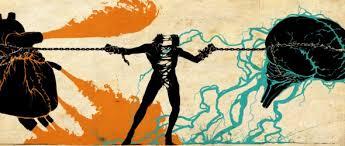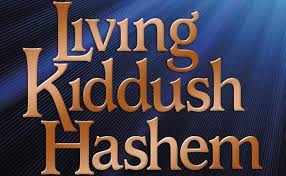Cc – The Reality of the Inner Conflict 7: 14-17
The Reality of the Inner Conflict
7: 14-17
The reality of the inner conflict DIG: Why does Paul introduce a first person plural here? In what way is the Torah spiritual? Prior to Paul’s conversion, how must he have felt about the inner turmoil described here? How did he try to deal with it (Philippians 3:4-6)?
REFLECT: In light of your own struggles with sin, how do you feel about Paul’s struggle? How is this a model for a healthy, realistic self-image? How are you doing with the wrestling match on a scale of one to ten? If you fall, what can you do to get back on your feet?
Our sin nature and our spirit are in a wrestling match; it is a constant, life-long struggle.

Throughout these verses Paul continues to write in the first person singular, as he portrays his own typical experience as an observant Messianic Jew. Yet, here, he breaks this pattern with a first person plural: We know. This serves to draw the readers of his letter into the discussion.186
We know that the Torah is spiritual (7:14a). This means that the Torah deals with our inner being, the spiritual part of us, as well as with the other actions. In the original giving of the Torah in Exodus, the emphasis was on the outward actions. But when Moshe restated the Torah in Deuteronomy, the spiritual emphasis is clearly stated (see the commentary on Deuteronomy, to see link click Cn – Circumcise Your Hearts). And when Yeshua gave His sermon on the mount (see The Life of Christ Cz – Introduction to the Sermon on the Mount), He emphasized the spiritual aspect of the Torah as well.
But I am unspiritual, sold as a slave to my old [sin nature] (7:14b). It is important to note that the apostle doesn’t say he is actively involved in a specific sin, but that he continually has to live with his old [sin nature] inherited from Adam. He has already explained that the old [sin nature] had died with Yeshua (6:5), and he received a new divine nature at salvation. From then on, he had a choice. He could choose to obey the old [sin nature] or his new divine nature. That was the nature of his inner conflict, and that is the nature of our inner conflict. Even as an apostle of Yeshua Messiah he possessed a remnant of the sinfulness that characterizes all human beings, including those of us who, in Messiah, are saved from its total mastery and its condemnation (8:1).
Just because we struggle with sin doesn’t mean we are not saved. It takes self-control and discipline to overcome the temptations that the world around us presents. Messiah fought and won that final battle over sin, but we need to apply that victory to our daily lives. Satan loves to whisper in our ear, saying we deserve this or that and making evil look like a reward. Often, we find a set of legalistic rules easier to follow than examining and changing our wrong attitudes and actions. In Chapter 8, Paul will give us some very valuable information about how to overcome sin.187
We must always remember that our spirit, our inner self, has been completely and forever cleansed of sin. We have been justified (see Ay – The Definition of Justification). It is for that reason that, at death, we are prepared to enter God’s presence in perfect holiness and purity. Because our spiritual rebirth has already happened, our flesh, with its [sin nature], will be left behind.
In one of the most famous passages in Romans, Paul now graphically portrays the reality of this inner conflict. I do not understand what I do. For what I want to do – I do not do, but what I hate – I do (7:15). Paul wonders why he can’t control the advance of sin within him. He has the right attitude – he wants to do what is right and good. Every mature believer is aware that his life falls far short of God’s perfect standard of righteousness and that he falls back into sin with disturbing frequency. Yet he cannot be happy with his sin, because it is contrary to his new nature and because he knows that it grieves his Lord as well as his own conscience. This is not to say that believers have a split personality, because we do not. Salvation makes us whole. But it does indicate that our mind, will, and body can be controlled either by the old [sin nature] or the new divine nature, either by the flesh or the Ruach.188 The reality of this inner conflict is that the battle with our [sin nature] is strenuous and life-long.
When we do succumb to the old [sin nature], Paul gives us the antidote: If we claim not to have sin, we are deceiving ourselves, and the truth is not in us. But if we acknowledge our sins, since YHVH is trustworthy and just, he will forgive them and purify us from all wrongdoing (First John 1:8-9).
And if I do what I do not want to do, I agree that the Torah is good because it points out my sin. As it is, it is no longer I myself who do it, but it is my [sin nature] living in me (7:16-17). This does not mean that Paul was avoiding personal responsibility for his actions; he was speaking of the inner conflict between his godly desires and the [sin nature] within him.
The question people in the world need to ask themselves is this, “Is it working for me?”

Dear Holy and Wonderful Heavenly Father, I love You and want to please You so please help me to have Your same attitude about sin’s awfulness. Let love be without hypocrisy—detesting what is evil, holding fast to the good (Romans 12:9). Sin broke God’s original loving relationship with man when Adam and Eve chose to follow their own way. Sin hurts any relationship. When a child sins against his parents, he is still their child but there is a separation, a wound between them that needs healing. Praise You, Yeshua, for healing that separation wound between mankind and God by Your death on the cross as the sacrificial Lamb of God (John 1:29) who bore the sin punishment of mankind. He made the One who knew no sin to become a sin offering on our behalf, so that in Him we might become the righteousness of God (Second Corinthians 5:21).
I want to be careful to not sin because sin hurts you and me. I am very concerned about family members and friends who claim to be “Christians” but who live in continual sin and it does not bother them. I do not mean that they sin once in a while, everyone sins some, but when a sin is brought before their eyes, they would rather ignore it and concentrate on God’s love. They forget that You are a Holy God. Their pride is big. Children, let no one mislead you! The one who practices righteousness is righteous, just as Yeshua is righteous. The one who practices sin is of the devil, for the devil has been sinning from the beginning. Ben-Elohim appeared for this purpose – to destroy the works of the devil (First John 3:7-8).
Please develop in me, in family and in friends a deeper awareness of doing anything, big or small that offends You, God, in any way, for You are so awesome! I want to please You in everything I do, even in my thoughts and finances. In Yeshua’s holy name and power of His resurrection. Amen

























